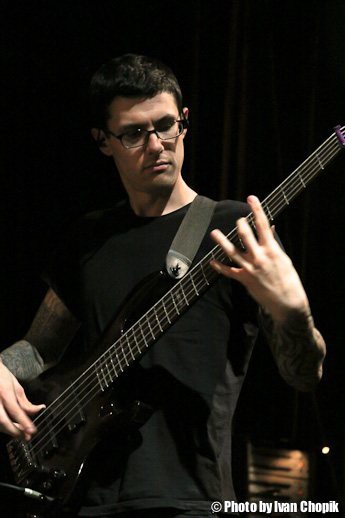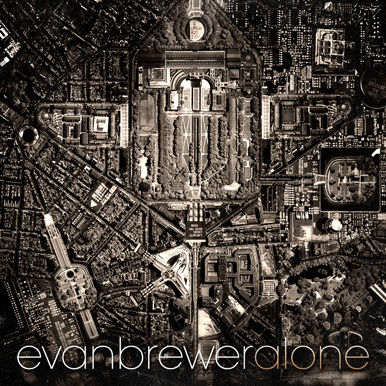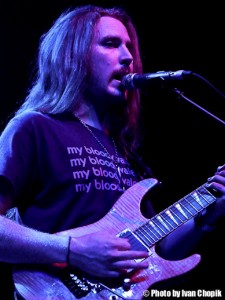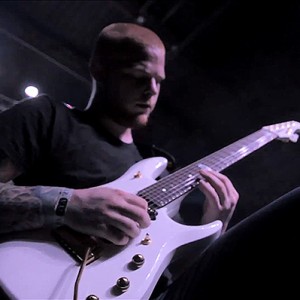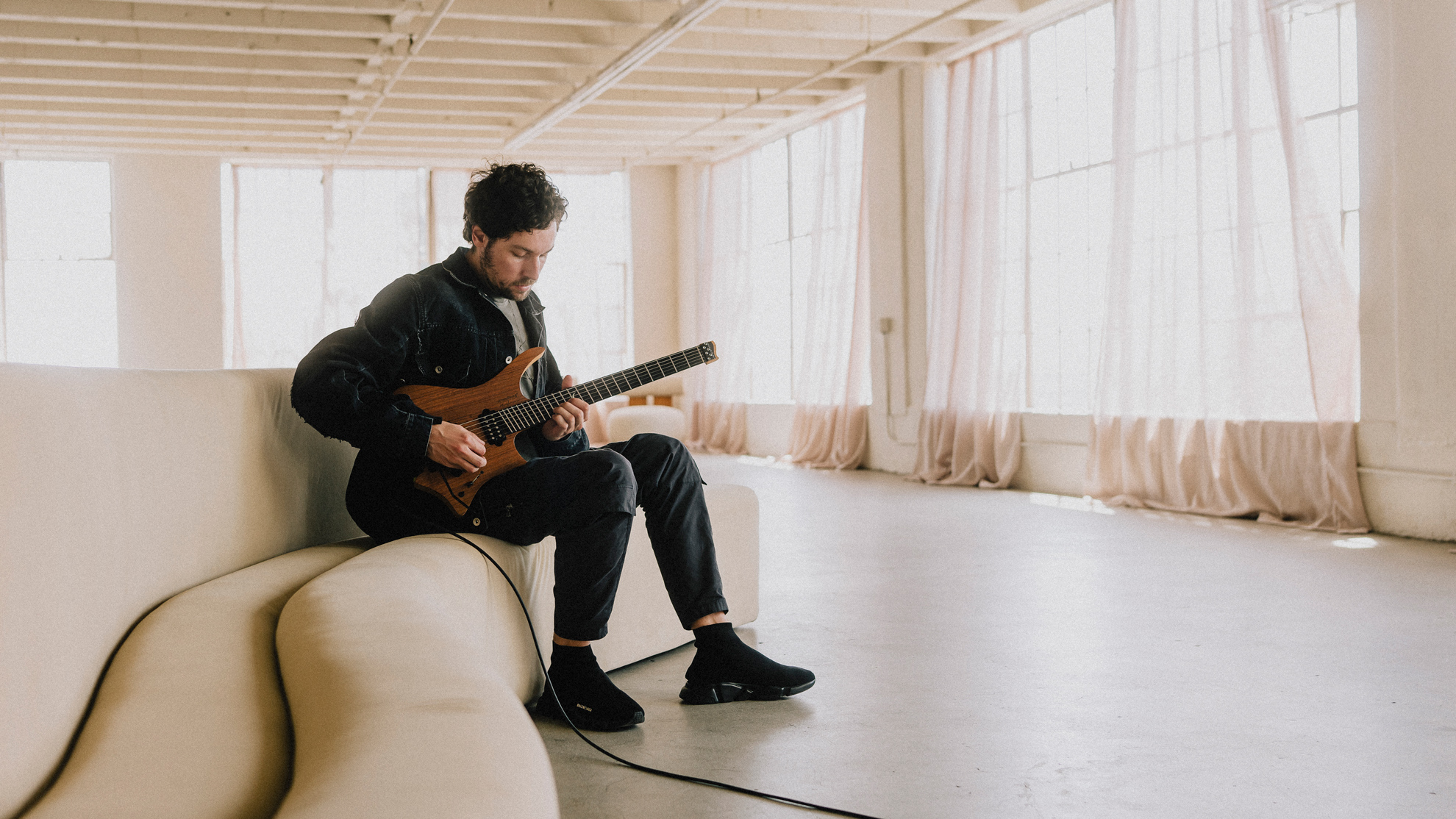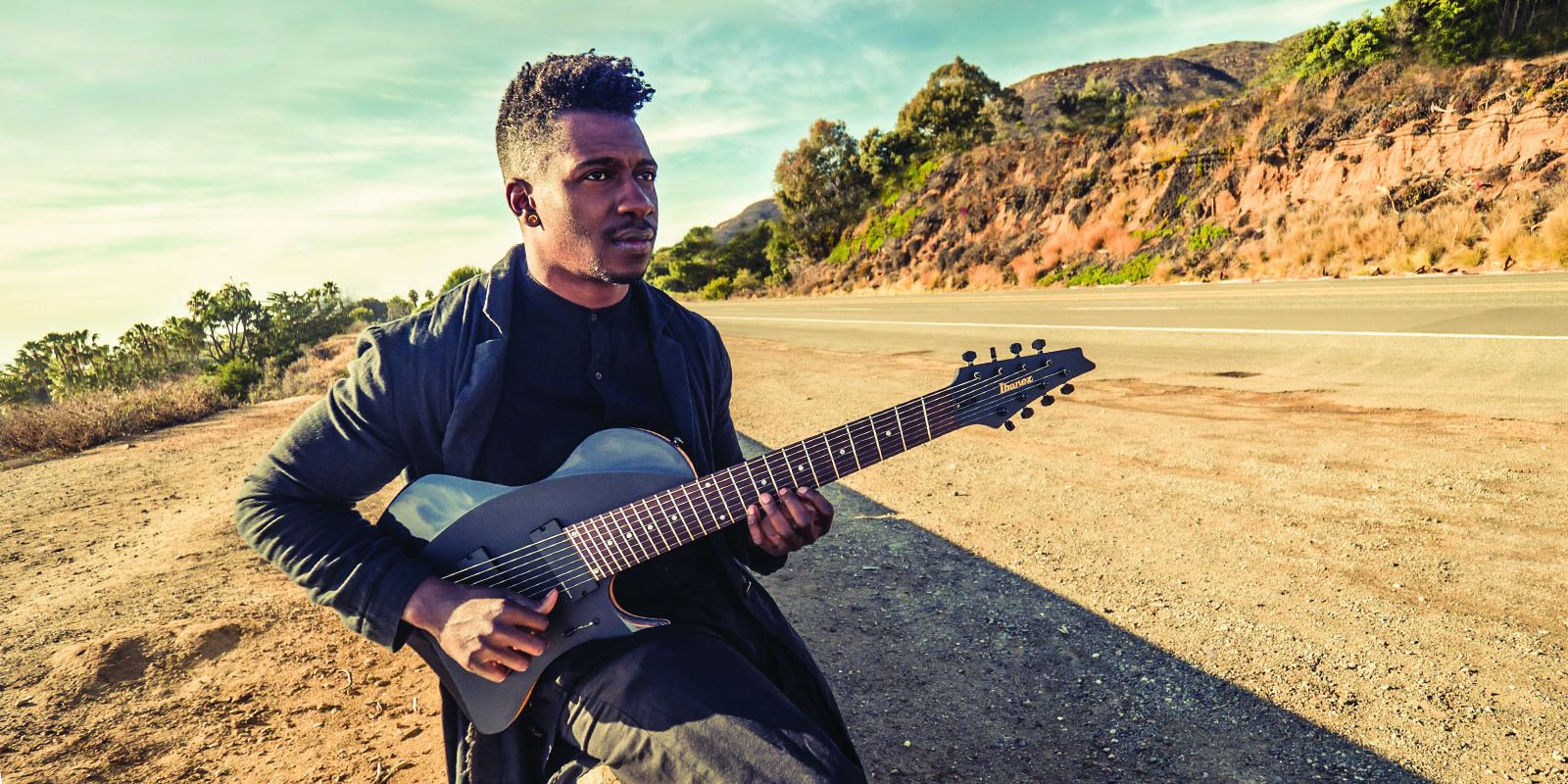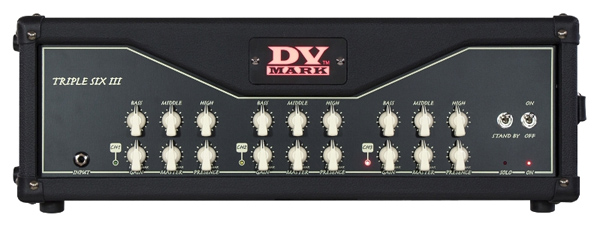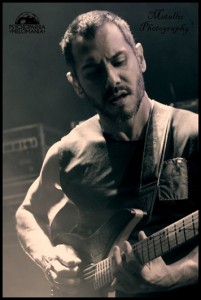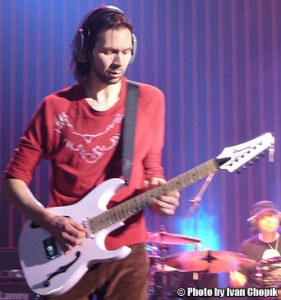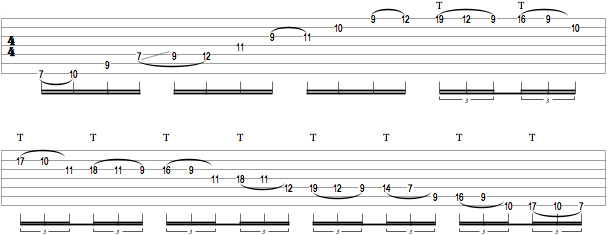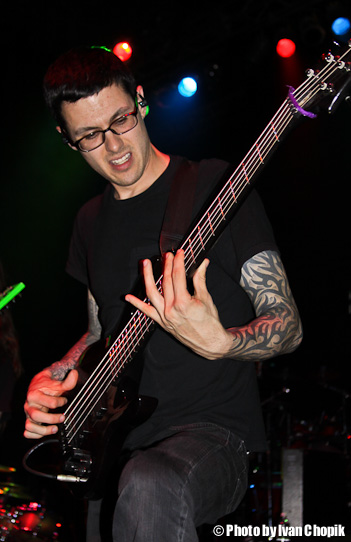 Many of you know of Evan Brewer as the bassist for technical death metal band The Faceless, as well as for his collaboration with Tosin Abasi of Animals As Leaders in the band Reflux. In June 2011, Sumerian Records released his first solo album Alone, which consists entirely of bass guitars and showcases the unorthodox playing techniques that allowed him to create the album’s unique timbres and soundscapes.
Many of you know of Evan Brewer as the bassist for technical death metal band The Faceless, as well as for his collaboration with Tosin Abasi of Animals As Leaders in the band Reflux. In June 2011, Sumerian Records released his first solo album Alone, which consists entirely of bass guitars and showcases the unorthodox playing techniques that allowed him to create the album’s unique timbres and soundscapes.
I am honored to have had the opportunity to speak with Evan for the first ever bassist interview at Guitar Messenger. On March 22nd, we met up before his show with The Faceless in Worcester, MA, where he shared his thoughts about unique ways of sounding original on your instrument and how crucial it is to stay inspired as a musician. Amongst other things, I also learned of his life growing up as a musician in Nashville, as well as the projects he is involved with currently.
AG: You’ve been a member of The Faceless for about a year now. What is it like looking back?
EB: Kind of uneventful. We haven’t done that much in a year [laughs]. We’ve just been writing. We’ve toured Europe, done some stuff in the U.S. This is really the first U.S. tour we’ve done since I got into the band. It’s mostly been behind-the-scene stuff going on.
AG: How did you initially come upon the opportunity to play in The Faceless?
EB: Well, they needed a bass player, so they called me. I’ve known those guys since before they had a record deal. I was in a band called Reflux, and they used to open up for us in L.A. And so, I’ve known them, and we’ve been great friends for years.
AG: So you were already really acquainted with them and you were a fan of their music?
EB: Oh, yeah. I mean, aside from them having opened for the band Reflux, we did 4 U.S. tours with The Faceless when I was in Animosity. We’re just good friends, we’ve known each other for years, so it just made sense.
AG: That seems like a really easy transition.
EB: Yeah, it was a good fit. [We didn’t have] to go through that whole thing of hooking up with someone, and you may have a pretty good idea that you would connect musically, but you wouldn’t know if the personalities would mesh. So we didn’t have to worry about that, which made it easy.
AG: You’re a very dynamic bass player and you’ve set yourself apart from other metal bassists. Obviously, bass isn’t [typically] a lead instrument but you’ve made a point of showing that it can be. Can we expect any solo bass work on the upcoming The Faceless album?
| Click play above to watch the video of this interview. |
EB: No, not at all. I appreciate what you said, by the way, thank you very much!
AG: Of course. [laughs]
EB: But you know, that’s the beauty of doing a solo album – you can put those ideas there. I love doing the whole solo thing, I love using the bass in unorthodox ways. That’s a huge part about me as a player, but another huge part of me as a player is traditional bass playing. So it’s really nice having put all those ideas in that format, so that I don’t really have to do that stuff [with The Faceless].
There are going to be parts that will have interesting bass lines, of course, but they’re going to have a traditional bass playing approach. It’s nice having done the solo work, because then I can go back with a regular band and really enjoy just playing with my fingers or just outlining chords and walking bass lines, and not worry about cramming in all that flash with them.
AG: Would you say that you prefer playing in more of a band context, rhythmically keeping the band together, or would you more likely want to pursue a solo career?
EB: I’m not big into one or the other. I try not to set limitations for myself – I want to do both. I’ve come to terms with the fact that where I’m at as a player there’s not ever going to be one band that’s going to be the ultimate satisfying band, because I like to play multiple genres. There’s not going to ever be one project that will completely fulfill me, so it’s going to take a lot of musical interaction. If you really connected with a person and you loved being around that person and talking to them, you wouldn’t say ‘well, this is the only person I’m ever going to talk to ever again for the rest of my life.’ You would still want to interact with other people.
AG: Best of both worlds.
EB: Yeah, you’d still want to know other people and have other experiences. So for me, I’m always going to be a busy bee. I’ll be doing all sorts of stuff.
AG: I’m really curious as to what your influences were for your solo bass album Alone. Obviously, you’re not influenced by other solo bass albums – I think it’s so unique and I was just wondering like what kind of music and artists have influenced you to create that type of music.
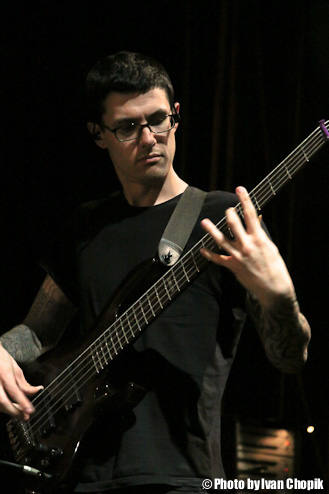 EB: Not bass players, really. You know, that’s what’s cool… it’s about taking other instruments you know and what you hear from another instrument and applying it to your instrument. It’s a very easy way to be original. So many people say they have a hard time finding their own voice and have a hard time being an individual, but to me it’s so easy. There are a million things you can do. Go learn a piano part and play it on your lap, like a piano – you know, play the bass here, the chords here, or flip your bass upside down or tune your bass weird or play an acoustic guitar part on the bass.
EB: Not bass players, really. You know, that’s what’s cool… it’s about taking other instruments you know and what you hear from another instrument and applying it to your instrument. It’s a very easy way to be original. So many people say they have a hard time finding their own voice and have a hard time being an individual, but to me it’s so easy. There are a million things you can do. Go learn a piano part and play it on your lap, like a piano – you know, play the bass here, the chords here, or flip your bass upside down or tune your bass weird or play an acoustic guitar part on the bass.
I could just sit here for all day and name a million different ways to be original, right off the bat. I always go outside of the instrument… If I hear a guitar player doing a crazy lead, I never say ‘well, I can’t do that.’ I’ve always been like ‘well, I want to be able to do that on my bass, who cares? It’s just a bass. There’s not any set way to play it. Just play it however.’
So, mostly I would say I’m not influenced by players, as much as the sound that the instruments make. I’ll hear a drummer and be like ‘how can I translate that,’ or I’ll hear a piano, or I’ll hear an acoustic guitar, or a style of playing, and I’ll say ‘I want to do that.’
AG: Was there any sampling or synthesis involved at all?
EB: Absolutely not on that album. Every sound on the album came from a bass guitar. So no other electronic elements, no other instruments, no other people were involved in the process in any way. Just me, a recording set up, and a bunch of basses. And that’s it.
AG: So is the tapping technique you use with both of your hands based on taking a piano part and playing it on your bass? Is that where that came from?
EB: Yeah, I think two-hand tapping on any instrument is roughly derived from a piano, but where it really becomes like a piano [is when you’re] splitting up the instruments. You can ring a chord and what would be tapped in front of the chord would mute these notes behind the tapping. But if you tap on a different instrument, this chord continues to ring, and you’re able to voice over it, without dampening the notes that you’re ringing behind it. That’s where you get into that voicing, because you can hit this note and sustain it and then play a solo over it like on piano.
AG: And it still resonates…
EB: Exactly. And that was the whole approach behind doing the two bass thing. And it’s a really useful tool. It looks crazy of course, but it’s not a show-off thing. It’s a very practical thing. I plan on doing a lot more of that stuff. To me that’s real. That’s hitting on what I’m into right now, creatively. I really like that approach… I suggest if anybody’s got two instruments laying around, you should mess with it, because it’s very fun.
AG: Did you start out as a bass player or a piano player?
EB: I’ve always been a bassist. I was never into guitar at all. I’m kind of getting into guitar now a little bit. It’s really fun. I got an acoustic guitar, so I like it. It’s a cool instrument, but I’ve just always been a bass player, since day 1.
AG: Did you take private lessons or any sort of formal instruction or did you mostly start playing on your own and experimenting?
EB: Well, I got very lucky. I’m from Nashville, Tennessee, and there’s a very eclectic music scene there. At a pretty young age, probably about 3 or 4 years into playing, I was already doing quite a bit with the bass, quite a bit for a young kid, and someone hooked me up with Reggie Wooten, the oldest brother of the Wooten brothers. He’s the guitar player and he taught all of them how to play their instruments. Hooking up with him from an early age, we became very close. We’re still very close friends and we would play all the time.
Being around those Wooten guys and that whole community at a very young age set the bar extremely high. They were doing extreme things with their instruments, but it became very normal. You know, you’re sort of a product of your environment. If you’ve never heard someone speak English, you’re not just going to be able to speak English out of nowhere, having never even heard the language.
It came to where some guy playing like this and doing all this crazy stuff was completely routine and normal for me growing up. That experience really created what you see now in a large part and there was also a lot of independent study in correlation with that. Also, if I ever saw a player I really respected or liked, I would just go out of my way to connect with them and get private lessons with them or even just pick their brain.
AG: So did that force you to want to get better or improve yourself?
EB: Well, I don’t know if that necessarily had much play in what I do on my instrument, but what it did, is it gave me a profound respect for what it means to be an artist. If you have someone that cares about what you do, it taught me to take that very seriously. It taught me, if someone comes up to me and wants to talk to me, to make time for them. You can actually make a big difference in someone’s life by showing them a few things, just taking two minutes out of your day.
It’s like ‘who am I?’ to get off stage and then go up to the dressing room and sit there alone. I’d rather just talk to people, you know? So that’s what I learned from that experience. But I suggest, kids or any player, however old you are, if there’s someone you respect, reach out to them. These days it’s even easier with all the social media to actually connect with the people whose brain you want to pick and actually ask them questions.
AG: You went on tour with Animals As Leaders [in support of] your solo bass album. I’ve never really seen a solo artist just come out and play during a metal show like that. What was the crowd response like and what was that experience like for you?
EB: Completely amazing. It was unbelievable. I knew it was going to go well… I just went into it with that attitude, so I felt like that’s what was going to happen and it went amazingly. People were completely engaged the whole time. It’s tough to put together a show that’s going to have a good flow when it’s just you, but it went really well.
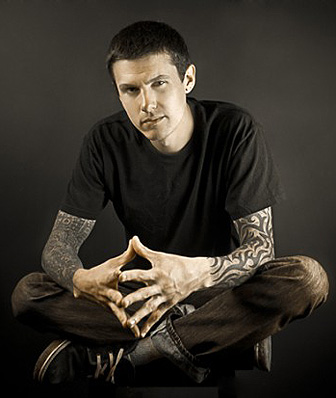
It was fun being out with them. We’ve been good friends and I was in a band with the guitar player of Animals As Leaders [Tosin Abasi], I was in a different band with the [former] drummer of Animals As Leaders [Navene Koperweis], so the only one I had not actually been in a band with was Javier [Reyes, guitar].
So already knowing those guys, I was riding with them, and it was basically like a reunion of sorts. So it was fun on multiple levels. I also grew a lot as a player doing that solo stuff. I still perform that [material] and have desire to do so a lot more. That tour was very productive for me.
AG: What other sorts of projects were you in prior to joining The Faceless?
EB: Well, I was in the band with Tosin, the Animals As Leaders dude, called Reflux.
AG: Was it a metal band?
EB: Yeah. We kind of like honed some of our skills together. That time, more than what we did with the band, for me and him, individually, it was about being in the same room together and bouncing ideas off each other. It was productive – he got a lot from me, I got a lot from him. After that I was in Animosity from San Francisco, and that was with [Navene Koperweis].
Growing up I did a ton of freelance work around Nashville. That’s where I really honed the musicality aspect of what I do… how I learned how to play music. I think so often heavy music is riff based and you can get by without actually knowing anything about music, does that make sense?
AG: That’s very true. I definitely hear you on that.
EB: The time in Nashville was the main development as far as melody, rhythm, and harmony, musicality, and also chops went. I was forced into a lot of situations where maybe I’d go out somewhere and be asked to sit in at a particular style gig… country, jazz, R&B, funk, and would be forced out of my comfort zone at a very early age. It taught me that I needed to be well rounded. In that city you almost have to be well rounded. So those experiences were vital.
Now I have this solo bass thing, obviously, and I also have a project where I write all the music and produce. It’s with a singer named Barry Donegan – his band is called Look What I Did. The project is called Climaxes. We have like a whole album of material, but it’s just sitting around and we don’t know what we’re going to do with it yet. If we don’t put it out with a label, we’ll probably just put it up for free or something. But it’s really cool and it’s fun working with singers – they’re just a different take on the whole thing. And then I got a few other things in the works… got like four new solo songs I’m working on right now.
AG: It sounds like Nashville is a place to just really get all sorts of opportunities in music. Would you encourage other musicians to go to Nashville and kind of delve into that? Does that make sense, or do you think in other places it could be the same?
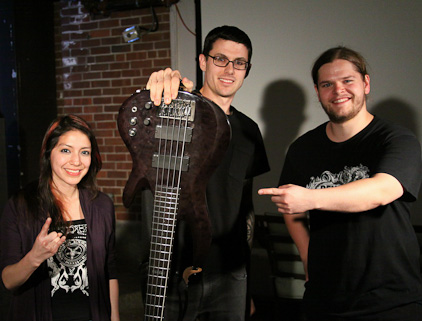
Annie Grunwald, Evan Brewer, Ivan Chopik
EB: I don’t think that Nashville has had a lot of musical opportunities for me in terms of gigs and work. All my stuff has come outside of that city for whatever reason. What it has had for me is a lot of opportunities early on to grow and to learn from people. There’s a wealth of knowledge there.
I would suggest if you wanted to go there for a little while and try to learn from people, that it would be a very good place to do that. If you’re going to try to get gigs, it depends on what you’re trying to do… I mean, it may work for you, but it didn’t really work for me.
AG: But you learned and were able to gain a lot of knowledge from the people that lived there.
EB: Absolutely. It’s a very, very, nice place. It’s worth going, for sure, and checking out. If you go [to audience], contact me and we can maybe meet up.
AG: Do you have any advice for bass players to get to the point where you are and be able to tour and release an album?
EB: I don’t know if I have advice for bass players or even really musicians, as much as just people or artists in general. My advice would be to seek inspiration, actively seek out things to inspire you. If you don’t have a fire or a passion you’re only going to go so far. For me it was very important and it’s still very important to reach out, play all the time with different players, try really hard to find inspiration, scour the Internet for people that are doing cool stuff, go out, look for people who are interesting, pick their brain, talk to them, get into conversations with them.
I think everything about being an artist requires inspiration. For you to have conviction in your music, for you to be productive, and crank out a lot of material and have it be something that’s going to be infectious and people are going to enjoy, you have to be inspired about what you do. So however you get it, just get it, that’s the most important part. That’s my advice.
[Special thanks to Chris Robinson for his excellent camera work, Chris Thomas for helping us out with camera gear on short notice, and Cigar Masters of Worcester, MA for their warm hospitality.]



